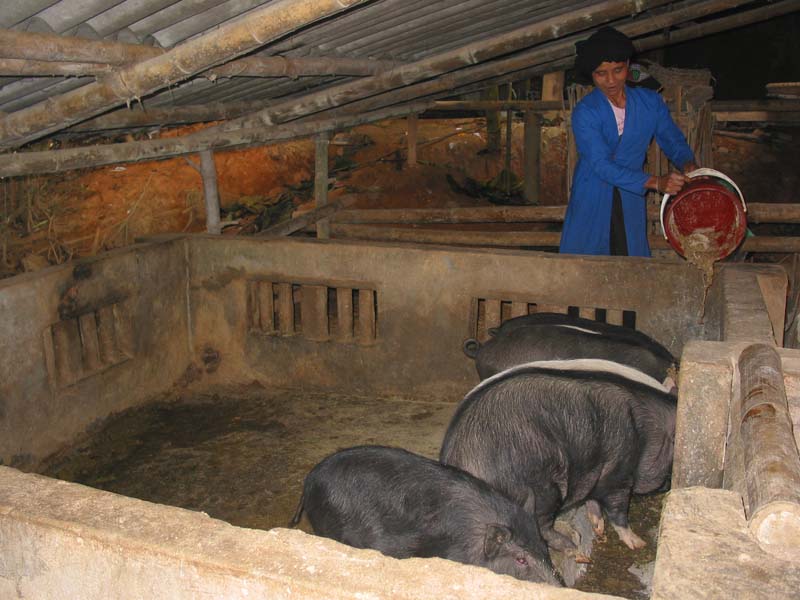
(HBO) - Indigenous Pigs are one of the special famous livestock of Da Bac highland district.

The pig raising family of Muong Chieng
Commune (Da Bac) manages the Indigenous pig herds at the cages to protect from
the diseases.
With more than 16,000 pigs, the local
indigenous pig population in the district accounts for more than 50% of the
total population of the province. Pig breeders are mainly ethnic minorities of
Muong and Dao ethnic groups. There is a fact that the habit of raising
indigenous pigs popularly has led to uncontrolled diseases. In addition, the
risk of genetic loss due to crossbreeding, crossbreeding among other pig
species, inbreeding quality, and near blood inbreeding, a decrease in the
number of originally indigenous pigs at the time of the survey before 2014 was
at at the urgent level. One of the objectives of the Project is to make
changes, change the method of old livestock raising to managed livestock
raising.
The 6 selected communes were Tan Pheo, Giap
Dat, Muong Chieng, Cao Son, Doan Ket and Hien Luong, propaganda and
dissemination activities together with technical training on animal husbandry,
care and disease prevention for indigenous pigs to the vet staff of the
communes have been implemented to support the farming households for actively
deploying. In particular, each commune has formed a group of indigenous pig
breeding. Since April of 2018, the Project has provided initial support to the
activities of cooperative groups. Specifically, they assisted in buying and
handing sows and male pigs of breeding directly to 90 households participating
in the model, each household had 2 sows, each cooperative group had a male pig.
The delivered pigs were purchased from local indigenous pig producers in the
area with careful selection and healthy, disease-free, ready for breeding.
Since the beginning of this year, under the direction of the Department of Agriculture and Environment, the Sub-Department of Agricultural, Forestry, and Fishery Product Quality Management has strengthened the integration of the professional activities to promote and guide the organizations and individuals in the production and trading of agricultural, forestry, and fishery products to comply with the legal regulations regarding the use of chemicals, pesticides and veterinary medicines in crop cultivation, livestock farming and aquaculture. They also provide guidance to processing and manufacturing establishments on keeping the records to trace the product origins and using food additives from the approved list according to the regulations.
Hoa Binh province saw a significant rise in state budget revenue in the first two months of 2025, heard a meeting chaired by Vice Chairman of the provincial People’s Committee Quach Tat Liem.
Ha Thi Ha Chi, a 26-year-old graduate in law, has taken an unconventional path by returning to her hometown in Mai Chau district to establish the Tong Dau Cooperative, creating stable jobs for local women and bringing Thai ethnic brocade weaving to the global market.
As the Lunar New Year 2025 approached, pork prices surged, creating a profitable season for farmers in Tan Vinh commune, Luong Son district. Taking advantage of the rising demand, Can Minh Son, a farmer from Coi hamlet, sold over 30 pigs at 69,000 VND/kg, each weighing more than 100 kg. After deducting expenses, his family earned a profit of over 50 million VND.
alternate member of the Central Party Committee, Secretary of the Hoa Binh provincial Party Committee Nguyen Phi Long on March 5 had a working session with Yan Jiehe, Founder and Chairman of the China Pacific Construction Group, one of China's largest private corporations in the field of transport infrastructure. Deputy Secretary of the provincial Party Committee, Chairman of the provincial People's Committee Bui Duc Hinh and leaders of provincial departments and sectors also attended the working session.
The electronic printed circuit board (PCB) manufacturing and processing plant of Japan’s Meiko Group, located at Da River Left Bank Industrial Park in Hoa Binh city with a total investment of over 200 million USD, is expected to create thousands of jobs and make a significant contribution to the local budget.



